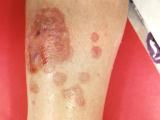Nov 14, 2012
Team tracks hospital MRSA outbreak using whole-genome sequencing
UK researchers used whole-genome sequencing to help solve and curtail a hospital outbreak of methicillin-resistant Staphylococcus aureus (MRSA), according to a report today in Lancet Infectious Diseases. Using standard protocols, the hospital infection control team identified 12 infants in a special care baby unit (SCBU) as having MRSA. Researchers from the Wellcome Trust Sanger Institute, the University of Cambridge, and Cambridge University Hospitals then used DNA sequencing to identify 26 related cases of MRSA carriage and show that transmission had occurred within the SCBU, between mothers on a postnatal ward, and in the community. The outbreak MRSA strain was a new sequence type: 2371. The team also used whole-genome sequencing to confirm that a staff member carrying MRSA had allowed the outbreak to persist during periods of no known infection in the SCBU and after deep cleaning. "What we have glimpsed through this pioneering study is a future in which new sequencing methods will help us to identify, manage, and stop hospital outbreaks and deliver even better patient care," said coauthor Nicholas M. Brown, MD, of Cambridge University Hospitals in a Wellcome Trust news release. The release said this is the first time that scientists had used DNA sequencing in this fashion.
Nov 14 Lancet Infect Dis abstract
Nov 13 Wellcome Trust news release
Study: Egyptian H5N1 cases, outbreaks had little effect on poultry practices
A study of Egyptian households that raised poultry found frequent practices that increased exposure to birds infected with H5N1 avian flu whether the home had had a previous H5N1 outbreak or case or not, according to a report in Influenza and Other Respiratory Viruses. Researchers from Egypt and the US Centers for Disease Control and Prevention (CDC) interviewed and observed members of 56 households: 19 that had had human H5N1 cases within 2 years, 19 nearby households that had had poultry H5N1 outbreaks, and 18 nearby households with no reported poultry or human H5N1 infections. They found no statistically significant differences among the three types of households in poultry-raising practices, slaughtering procedures, and hygiene steps taken for slaughter. Slaughter-related hygiene was lacking in general, with just 25% of households reporting use of soap and water to wash hands and only 18% reporting use of gloves or plastic bags worn on the hands during slaughter. The researchers also found that not reporting likely H5N1 outbreaks was common. They wrote that education efforts "should focus on perceptions underlying traditional practices in order to tailor public awareness messages that are meaningful for communities."
Nov 12 Influenza Other Respi Viruses abstract
Researchers test-drive malaria challenge test
In a development that could pave the way for easier-to-conduct human challenge studies of new malaria drugs and vaccines, scientists showed that they can successfully infect human volunteers with cryopreserved sterile parasites harvested from mosquito salivary glands. Researchers at from the Netherlands and two biotechnology companies presented the findings recently at the American Society of Tropical Medicine and Hygiene (ASTMH) annual meeting and published their findings in the organization's journal yesterday. Meta Roestenberg, MD, with Radboud University Nijmegen Medical Center in the Netherlands, said in an ASTMH press release that the team's work shows that it's possible to manufacture and administer controlled doses of malaria parasites, using a needle and syringe to deliver a formulation that meets regulatory standards for purity and dose consistency. Current methods of testing malaria treatments and vaccines are costly and difficult, and it's difficult to ensure that subjects receive the same level of infection, she said. Researchers injected 18 healthy Dutch volunteers with the frozen Plasmodium falciparum parasites. They said the technique might also be useful for developing whole-parasite vaccines against malaria.
Nov 13 ASTMH press release
Nov 13 Am J Trop Med Hygiene abstract
Drop in global polio cases fuels experts' optimism
The number of polio cases this year has shown a dramatic drop from the same period in 2011, with 177 reported so far this year, compared with 502 during the same time last year, according to presentations at the ASTMH annual meeting. Experts said for the first time there were no outbreaks beyond countries in which the disease already circulates, another signs that international campaigns to eradicate polio are showing some success, according to an ASTMH news release. One of the remaining challenges is, especially in Pakistan and Nigeria, parents who refuse to vaccinate their children because of religious objections, political issues, or suspicions about the vaccine. Disease experts are seeing a glimmer of hope in Pakistan, where new data suggest that wildpoliovirus 3, one of two types that circulates in the country, is close to being eliminated. Steven Wassilak, MD, a medical epidemiologist with the US Centers for Disease Control and Prevention (CDC) said in the press release that no type 3 cases have been recorded in the country for the past 6 months, the longest gap to date. He also added that type 3 is down to one chain of transmission, "an indication that we are close to breaking the last link of type 3."
Nov 13 ASTMH press release





















